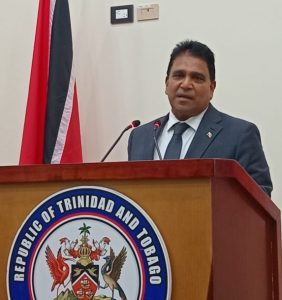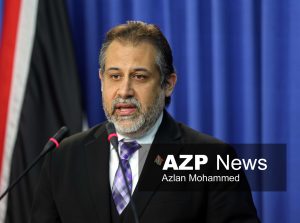By Sue-Ann Wayow
TRINIDAD and Tobago will not be entering into any International Monetary Fund (IMF) programme, at least not under the present administration.
“It is the last thing any country would want to do,” Finance Minister Colm Imbert said.
Imbert said that the last time the country entered into such an agreement, there was economic hardship for citizens.
Imbert held a press conference on Monday to further dissect the concluding statement of the 2023 Article IV Mission to T&T – an annual check by international experts of the country’s economy and finances.
He said that given the current state of T&T’s economy, there was no need to get into an IMF programme adding that it was used as a last lending resort for economically distressed countries usually when having a balance of payment crisis and quite often a currency crisis.
“When one speaks about a currency crisis, one speaks about the fact that you have no foreign reserves,” Imbert said.
He said he was told of some countries where every day, the money was checked and based on what they get that day, “then they will figure out what bills they pay tomorrow.”
Imbert said, “We are nowhere near there. So that we have absolutely no need to go to the International Monetary Fund. We have substantial financial buffers as they are called, we have substantial reserves to foreign currency which has stabilised in the $6.8, $7 billion dollar range now for the last two years or so.
“Our public debt has stabilised at about $129 billion and our debt to GDP ratio is coming down. Our current account is in surplus, our balance of payments is positive so we don’t need to go to the IMF.”
Using a slide presentation, the minister focused on 20 points. He said out of the 20 main points outlined by the IMF, 17 were positive which meant that the outlook on the economy was more positive than negative.
He also said, “Because we are not in an IMF programme, we don’t have to agree with anything that the IMF advises us to do.”
Government will continue to enhance Export Import Bank of Trinidad and Tobago Limited (Eximbank), he said.
One of the recommendations that is not agreed with, is the removal of restrictions on current international transactions.

Imbert repeated that the government led by Prime Minister Dr Keith Rowley has resisted any call by any sector to devalue the TT dollar.
“We believe that is going to send hundreds of thousands of people into poverty. We believe it will cause hyperinflation and we believe it will cause tremendous damage. So when the IMF says that it encourages the authorities to remove all restrictions on current national transactions, we are not doing that,” he said.

That was the reason why the Eximbank, the only official Export Credit Agency (ECA) in the country was created, Imbert said.
Through that institution, foreign exchange is provided for the importation of essential foods, pharmaceuticals and to manufacturers.
The minister said, “We will continue to boost that system. We will further expand it to other categories that are in the public interest. We will put more money into the Eximbank and so on so that our foreign exchange is focused on creating jobs and on boosting exports and also dealing with the import of essential items.”
Imbert also said, “We shall not be pumping US dollars into the system for people to buy townhouses in Miami.”
No increase to interest rates
Imbert said the IMF was also asking T&T to consider raising the policy rate, to an increst rate that would stifle the economy.
Since March 2020, the Central Bank has maintained its repo rate at 3.5% to support the recovery of the economy, he said.
Imbert said in a meeting with IMF and Central Bank Governor Dr Alvin Hilaire, the point was made that unlike the US Federal Reserves in which there were legal mandates to use interest rates to contain inflation, “we have no such mandate in T&T.”
He said, “Simply, the Central Bank does not want to crash the economy.”
The suppression of inflation in the US by the legal mandates also suppressed economic growth, employment and caused problems for banks.
“They couldn’t cope with those increased interest rates,” Imbert said.
![]()













